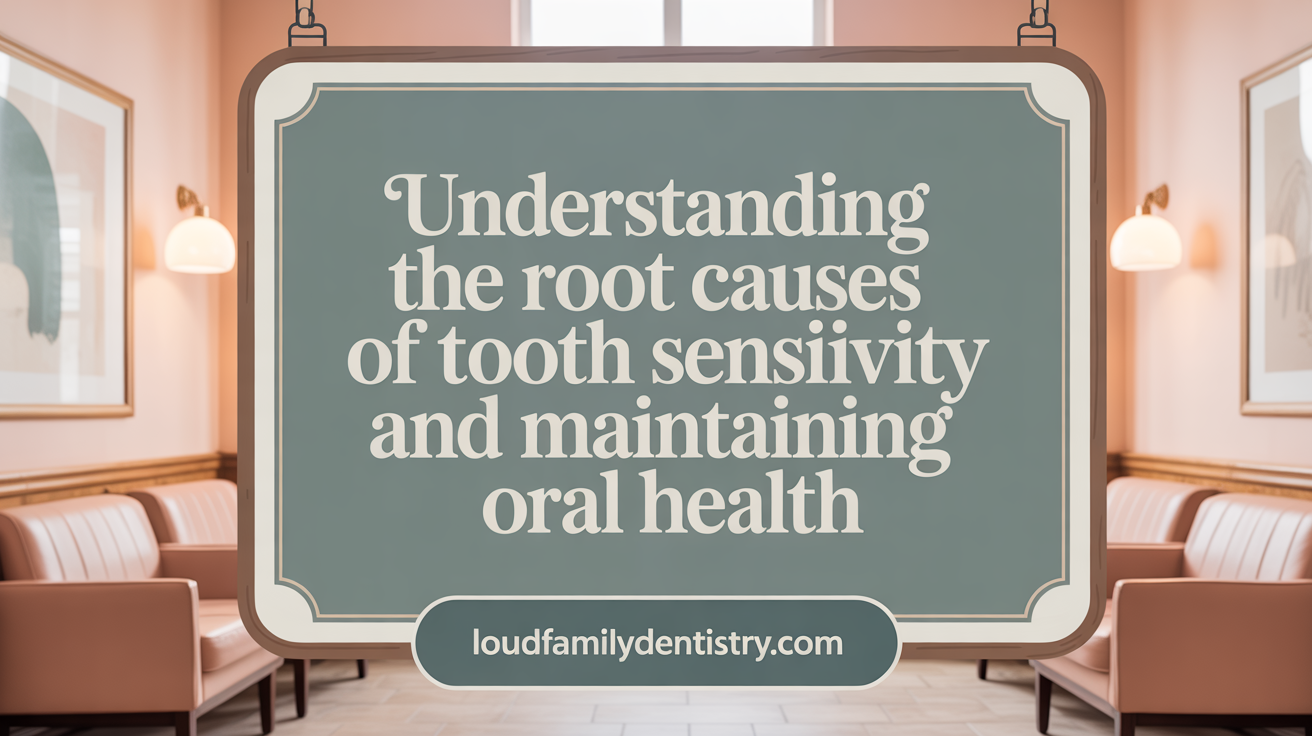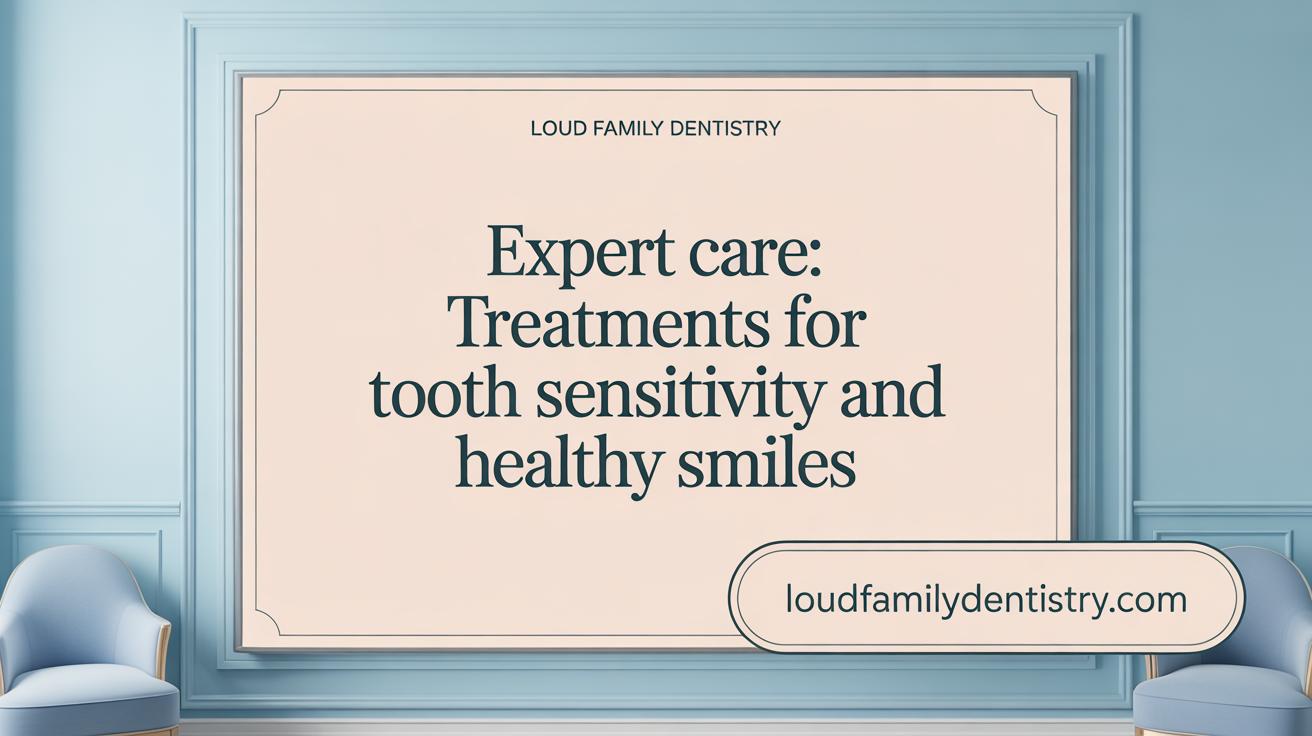Understanding Tooth Sensitivity
Tooth sensitivity, also known as dentin hypersensitivity, affects a significant portion of the population, causing sharp, temporary pain in response to stimuli like hot, cold, sweet, or acidic substances. This condition arises when the protective layers of the tooth are compromised, exposing nerve endings and causing discomfort. Understanding the causes, symptoms, and management options is essential for those seeking relief and long-term prevention of tooth sensitivity.
Causes and Mechanisms Behind Tooth Sensitivity

What is dentin hypersensitivity?
Dentin hypersensitivity, commonly known as tooth sensitivity, is characterized by a sharp, brief pain that occurs in response to stimuli like hot, cold, sweet, or acidic foods and beverages, as well as during brushing or flossing. It occurs when the protective enamel layer becomes worn down or when the gums recede, exposing the underlying dentin.
Common causes such as enamel erosion and gum recession
The main causes of sensitive teeth include enamel wear from acidic foods and drinks, aggressive brushing, and gum recession caused by periodontal disease or aging. When enamel erodes or gums recede, the exposed dentinal surfaces lack the protective layer, leading to increased sensitivity.
How enamel wear or gum issues expose dentin
Enamel erosion occurs when the mouth is frequently exposed to acids from citrus fruits, sodas, or vinegar-based foods, gradually wearing down the enamel. Gum recession exposes the roots of teeth, which naturally lack enamel, making them more vulnerable to stimuli.
Impact of dental issues such as cavities and cracked teeth
Dental problems like cavities, cracked teeth, or chipped enamel can create direct pathways for stimuli to reach the nerve endings inside the tooth. These issues decrease the protective barriers and result in localized sensitivity.
Mechanism of sensitivity to hot and cold stimuli and the hydrodynamic theory
The hydrodynamic theory explains that thermal sensitivities are caused by fluid movement within tiny tubules in the dentin. Cold stimuli cause rapid fluid movement, activating nerve fibers and producing sharp pain. Hot stimuli may cause similar fluid movements or nerve activation, but can also involve direct nerve damage or hypersensitivity due to decay.
Triggers like acidic foods, whitening products, and teeth grinding
Certain foods and beverages, especially acidic ones like citrus or vinegar, erode enamel and increase sensitivity. Whitening products contain bleaching agents that can temporarily soften enamel, exposing dentin. Teeth grinding (bruxism) causes mechanical wear, thinning enamel and exposing sensitive dentinal tubules.
| Cause | Description | Additional Details |
|---|---|---|
| Enamel erosion | Gradual loss due to acids | From dietary acids or vomit |
| Gum recession | Exposure of tooth roots | Due to gum disease or aging |
| Dental decay | Cavities or cracks | Creates pathways for stimuli |
| Aggressive brushing | Enamel abrasion | Using hard brushes or pressure |
| Teeth grinding | Mechanical wear | Often at night, causes enamel thinning |
| Use of whitening products | Chemical softening of enamel | Temporary increase in sensitivity |
Understanding these causes and how they lead to sensitivities helps in managing and preventing this common dental concern.
Preventive Strategies to Protect Against Sensitivity

Importance of Good Oral Hygiene
Maintaining proper oral hygiene is crucial in preventing tooth sensitivity. Brushing twice daily with fluoride toothpaste and flossing regularly help remove plaque and bacteria that can cause gum recession and enamel erosion, both linked to increased sensitivity.
Using Soft-Bristled Toothbrushes and Gentle Techniques
Choosing a soft-bristled toothbrush and brushing gently minimizes enamel wear and gum irritation. Aggressive brushing can exacerbate gum recession and wear down enamel, exposing dentin that leads to sensitivity.
Limiting Acidic and Sugary Foods
Avoiding foods and drinks high in acidity—such as citrus fruits, tomatoes, pickles, and soda—protects enamel from erosion. Reducing sugary foods also decreases plaque buildup, which can contribute to gum disease and sensitivity.
Avoiding Aggressive Brushing
Applying too much pressure or brushing vigorously can strip away enamel and damage gums. Instead, use light, circular motions and a soft brush to maintain oral health without increasing sensitivity.
Role of Fluoride-Containing Products in Prevention
Incorporating fluoride toothpaste and mouthwash strengthens enamel, making it more resistant to acid attacks. Regular use of fluoride products can also block nerve pathways and reduce sensitivity over time.
Managing Teeth Grinding with Night Guards
If you grind or clench your teeth (bruxism), wearing a custom night guard can prevent further enamel wear and dentin exposure. This protective device reduces pressure on teeth, decreasing sensitivity caused by nerve stimulation.
Regular Dental Checkups to Detect Early Problems
Routine dental visits are essential for early detection of issues like gum recession, decay, or worn enamel. Professional cleanings and examinations help address problems before they worsen, keeping teeth healthy and reducing sensitivity risks.
Treatment Options and Professional Care for Sensitive Teeth

What are the available treatment options for tooth sensitivity?
Addressing tooth sensitivity involves various professional and at-home treatments. Dentists often recommend desensitizing toothpaste and mouthwashes that contain active ingredients like potassium nitrate or stannous fluoride. These products work by blocking nerve pathways in the teeth, providing relief over time.
For more targeted treatment, fluoride applications such as fluoride varnish can strengthen enamel in vulnerable areas, reducing sensitivity significantly. Dental sealants or bonding are also effective for covering exposed dentin or root surfaces, especially when sensitivity stems from enamel erosion or cracks.
When gum recession exposes sensitive roots, gum graft procedures can help by covering these areas with tissue taken from another part of the mouth. This procedure not only alleviates discomfort but also helps prevent further recession.
In severe cases where pain persists despite other treatments, root canal therapy may be considered. This procedure removes damaged or infected nerve tissue from within the tooth, offering long-term pain relief.
Beyond professional procedures, adopting gentle oral care habits is crucial. Using a soft-bristled toothbrush and avoiding acidic, abrasive, or sugary foods can prevent worsening sensitivity and protect existing dental structures.
Regular dental checkups are vital to identify underlying issues such as cavities or gum disease early, allowing timely intervention and maintenance of oral health.
Home Remedies and Practical Tips for Immediate Relief

How can I immediately relieve sensitive teeth pain with home remedies?
To quickly soothe sensitive teeth, start by applying a small amount of vanilla or clove extract directly onto the affected spot. Both have natural numbing and antiseptic properties that can help ease pain temporarily.
Rinsing your mouth with a diluted hydrogen peroxide solution (about 3%) a few times weekly can assist in reducing inflammation and promoting healing of sensitive areas. It’s important not to swallow the solution and to rinse thoroughly afterward.
Switching to a toothpaste designed for sensitivity that contains active ingredients like potassium nitrate or stannous fluoride can provide quick relief. Such toothpastes work gradually to block nerve signals, decreasing pain.
Avoid consuming hot, cold, and acidic foods and drinks to prevent further irritation of exposed dentin and nerve endings.
Gentle brushing with a soft-bristled toothbrush minimizes enamel abrasion and gum irritation, offering immediate protection for sensitive teeth. Also, try to refrain from brushing immediately after eating acidic foods to avoid eroding enamel further.
How can I calm a sensitive tooth nerve?
Calming a nerve in a sensitive tooth often involves reducing inflammation and nerve stimulation. Over-the-counter pain medications like ibuprofen or acetaminophen can help manage the discomfort temporarily.
Applying a dental gel or ointment with benzocaine, a numbing agent, can offer local relief. Rinsing your mouth with warm salt water (one teaspoon of salt in 8 ounces of warm water) helps decrease inflammation and remove debris that can irritate the nerve.
Using a cold compress or ice pack on your cheek, near the affected area, can significantly reduce nerve pain and swelling.
It’s also beneficial to avoid triggers such as extreme temperatures, sugary, or acidic foods that can stimulate the nerve.
Switch to a toothbrush made for sensitive teeth and maintain gentle brushing techniques to avoid additional enamel damage.
If the pain continues for more than a couple of days or is accompanied by swelling, pus, or fever, seek dental care promptly to prevent complications and obtain tailored treatment.
Identifying Triggers and Daily Habits to Manage Sensitivity
Recognizing Foods and Drinks That Cause Discomfort
Certain foods and beverages are known to trigger tooth sensitivity. Acidic items like citrus fruits, tomatoes, pickles, and tea can wear down enamel, increasing discomfort. Sugary and sweet foods may also stimulate nerve endings in sensitive teeth. Monitoring your intake and avoiding these items when possible can reduce pain.
Using Straws to Reduce Exposure to Cold Drinks
Drinking cold beverages through a straw is an effective way to minimize direct contact with sensitive teeth. This method helps limit the cold liquid's contact with the nerve endings inside your teeth, decreasing the likelihood of discomfort.
Techniques to Consume Cold Foods to Minimize Pain
When eating cold foods like ice cream, try licking instead of biting. This avoids direct pressure on sensitive teeth. Additionally, allowing hot beverages or soups to sit for a few minutes to reach room temperature before drinking can lessen sensitivity triggers.
Breathing Through the Nose in Cold Weather
Cold air can exacerbate tooth sensitivity, especially in winter. Breathing through your nose rather than your mouth helps warm the air before it contacts your teeth, reducing the risk of discomfort caused by sudden cold exposure.
Following Dentist Instructions When Whitening Teeth
Teeth whitening procedures often cause temporary sensitivity. It’s important to follow your dentist’s guidelines carefully, such as avoiding overuse of bleaching products and using desensitizing toothpaste as recommended. This prevents unnecessary aggravation of sensitive areas.
Maintaining a Balanced Diet to Protect Enamel
A diet rich in nutrients and low in acids helps maintain strong, healthy enamel. Incorporate foods like dairy, leafy greens, and nuts. Limit intake of acidic foods and drinks that erode enamel and expose dentin, which contributes to sensitivity.
Importance of Lifestyle Adjustments Like Quitting Smoking
Smoking impairs oral health, affects gum tissue, and can worsen gum recession, exposing sensitive roots. Quitting smoking promotes healthier gums and tooth structures, reducing the risk and severity of sensitivity over time.
| Tips for Managing Tooth Sensitivity | Practical Actions | Additional Benefits |
|---|---|---|
| Recognize food triggers | Avoid citrus, sweets | Reduce discomfort and protect enamel |
| Use a straw for cold drinks | Drink through a straw | Minimize cold exposure |
| Lick cold foods rather than bite | Consume slowly | Less direct contact with sensitive areas |
| Breathe through your nose in cold | Keep mouth closed | Warm air reduces cold sensitivity |
| Follow whitening guidelines | Use desensitizing toothpaste | Prevent temporary sensitivity |
| Consume balanced, low-acid foods | Limit citrus, soda | Protect enamel and reduce nerve stimulation |
| Quitting smoking | Seek support programs | Improve overall oral health |
Empowering Your Oral Health: Taking Control of Tooth Sensitivity
Tooth sensitivity is a common yet manageable condition that affects many individuals worldwide. By understanding its causes, recognizing triggers, and adopting effective prevention and treatment strategies, you can significantly reduce discomfort and maintain a healthier, pain-free smile. Incorporating gentle oral care, appropriate dental products, home remedies, and seeking timely professional advice are key steps to managing sensitivity successfully. Empower yourself with knowledge and proactive habits to enjoy your favorite foods and beverages without the fear of pain or sensitivity.
References
- Sensitive Teeth: Why They Hurt and How to Stop the Pain
- Sensitive Teeth: Causes, Treatment & Prevention - Cleveland Clinic
- What You Need to Know About Managing Tooth Sensitivity
- How to Relieve Tooth Sensitivity & Pain: Tips and Treatments
- 10 Tips for Managing Sensitive Teeth | 209 NYC Dental
- 10 Easy Home Remedies to Get Relief from Sensitive Teeth
- Effective Strategies for Minimizing Tooth Sensitivity
- How to Manage Tooth Sensitivity - Dentist Grand Junction
